Eucalyptus citriodora, PMD, P-menthane-3,8-diol or Citriodol®,
a natural repellent
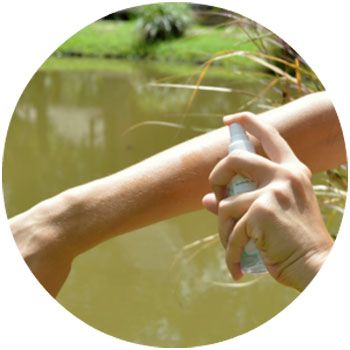
What is Eucalyptus citriodora ?
It goes by many names : p-menthane-3,8-diol, paramenthane-3,8-diol, PMD, menthoglycol or Citriodol®. In fact, all these names correspond to a molecule contained in the essential oil of lemon eucalyptus (eucalyptus citriodora).
It is a repellent naturally present in very small quantities in the essential oil of the leaves of the lemon eucalyptus (Corymbia citriodora), a tree endogenous to Australia, but now cultivated in most of the world's hot spots.
This essential oil is known in the United States as "oil of lemon eucalyptus".
It has been registered under the European Biocidal Products Directive (BPD) 98/8/EC.
It is the only derivative of an active natural compound that can be used as an insect repellent in the United States and Europe.
This product is used in repellent products that can be applied to the skin, clothing or other surfaces to repel insects such as mosquitoes.
Is Eucalyptus citriodora toxic ?
When used in accordance with the instructions on the label, eucalyptus citriodora is not considered a hazardous substance for humans or the environment.
Risks to human health
Eucalyptus citriodora is in toxicity category 4 (practically non-toxic) for oral, skin and dermal irritation, but in toxicity category 2 (moderately toxic) for eye irritation. As a result, it is generally safe to use, but care should be taken to keep it out of the eyes, especially with young children. When using this type of product, there are a few basic rules to follow :
- Do not get it in your eyes
- Do not apply to the face or hands of small children.
- Do not spray directly onto or near the face, but spread over the face and neck with your hand.
Risk to the environment
Due to its low toxicity and limited use, Eucalyptus citriodora is not considered harmful to the environment.
Effectiveness of Eucalyptus citriodora
DEET has been the benchmark for body repellents for many years. It is a chemical that has been used in insect repellents for decades. But it is also highly controversial.
Eucalyptus citriodora has been shown to be as effective as DEET in terms of duration of action and repellent effect. In addition, Eucalyptus citriodora extract is approved as a repellent against tropical mosquitoes.
The CDC (Center for Disease Control) has recognised 'Oil of Lemon Eucalyptus' (OLE) as the only natural substance derived to repel mosquitoes carrying the West Nile virus.
This natural active ingredient is effective against a wide range of flying and crawling sucking insects that seek to bite you for food. It repels mosquitoes, gnats, sand flies, biting flies and fleas, as well as ticks, leeches, bedbugs, augusts, flies, ants, etc.
Does it work on all insects ?
In general, it works well on most insects. However, it is much less effective against spiders and certain stinging insects such as bees, wasps and hornets.
But whatever the active ingredient or concentration, no repellent is 100% effective, since one in 4 or 5 stings will be through clothing.
Effectiveness and duration of action vary widely depending on the concentration of the product, and to date there has been no evidence of 'mosquito resistance' or of repellents losing their effectiveness over time.
This natural active ingredient is effective against a wide range of sucking, flying and crawling insects. In particular, it repels mosquitoes, midges, sand flies, biting flies, fleas, leeches, bedbugs, augusts, ants...
... and many species of mosquito, potential vectors of infectious diseases :
- the aedes aegypti mosquito : vector of yellow fever
- the anopheles gambiae and anopheles arabiensis mosquitoes : vectors of malaria
- the tiger mosquito or aedes albopictus : vector of chikungunya, dengue fever and zika
- the Culex pipiens mosquito : vector of West Nile virus
- Ticks : vectors of Lyme disease, tick-borne encephalitis and borreliosis.
Natural or synthetic PMD ?
PMD can also be synthesised, but one study shows that repellents using mixtures of synthetic PMD are not as effective as those containing natural mixtures.
This observation is generally applicable to all molecules that are synthesised. For example, eucalyptol is known to be less effective than eucalyptus.
Recommended repellents
In 2009, the French Ministry of Health deemed products composed of the following four main molecules to be effective as body mosquito repellents: DEET, picaridin (icaridin), IR3535 and P-menthane diol (PMD).
Some formulations contain essential oils, but their use is not recommended.
Sun protection
If necessary, the sun protection must have penetrated the skin and a 20-minute delay is recommended before applying the repellent.
PMD and children under 30 months ?
PMD, which comes from the essential oil of eucalyptus citriodora, appeared in the IRD (Institut Recherche Développement) table of January 2006 for use from 3 months.
The main biochemical constituents of eucalyptus citriodora are terpenes: monoterpenes, monoterpenols, terpenes and sesquiterpenes, including citronellal (>74%).
Afssaps advises against the use of terpene-based products in children under 30 months of age due to the risk of convulsions (an exceptional effect, however, depending on the dose administered).
As PMD has a similar molecular structure and contains terpenes (0.35%), Afssaps, as a precautionary measure and pending further information, has decided not to recommend PMD for children under 30 months. So far, however, no cases of neurotoxicity have been recorded, and no adverse effects were reported during the chikungunya epidemics in Réunion in 2006, when over 100,000 PMD-based packs were dispensed to the population.
Natural body protection against insects
We offer 6 body protection products, with Eucalpytus citriodora as the main active ingredient :
1 - Penntybio anti-insect lotion spray for the skin, concentrated at 25% PMD. It contains no gas, synthetic products or alcohol, just vegetable oil. It can be used to repel all biting and sucking insects, protecting you from their bites (bedbugs, mosquitoes, ticks, red lice, etc). Available in 50ml or 125ml.
2 - Penntybio Anti-Insect Skin Roller. With a dual function, keeping biting insects at bay with lemon eucalyptus, but also moisturising the skin with aloe vera. Easy to apply thanks to its roll-on ball.
3 - ARIES mosquito repellent skin balm. This skin repellent balm provides gentle protection against mosquitoes for 4 hours. The combination of moisturising active ingredients such as almond and shea combined with the repellent properties of lemon eucalyptus.
4 - ARIES skin mosquito repellent lotion, concentrated with 20% PMD. Effective against European and tropical mosquitoes. Propellant-free, compressed-air spray, 100% active product. Free from synthetic products.
5 - ARIES Anti-tic skin lotion, concentrated with 20% PMD. The natural solution, specially designed to effectively protect your skin against tick bites. Propellant-free, compressed-air spray, 100% active product. Free from synthetic products.
6 - ARIES moisturising anti-mosquito lotion, concentrated with 13.2% PMD. Effective against European and tropical mosquitoes. Protects against mosquitoes and moisturises your skin at the same time, thanks to the shea butter it contains. Propellant-free, compressed-air spray, 100% active product. Free from synthetic products. Provides up to 6 hours of protection.






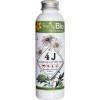
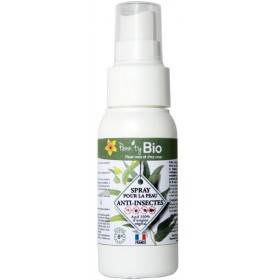
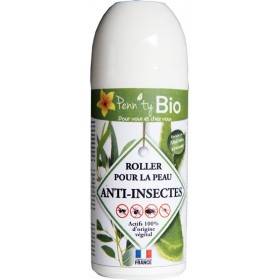
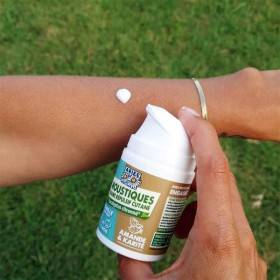
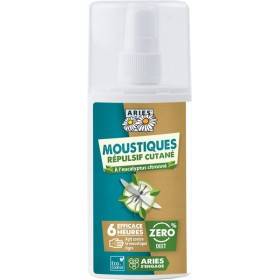
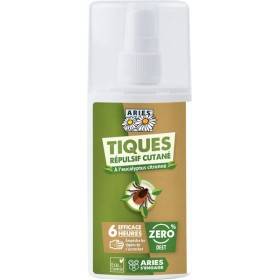
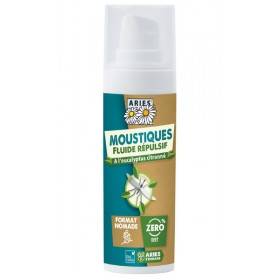
Customer reviews
Je suis ravi de trouver les produits de qualité et d ‘efficacité incomparable.
Denitza K.
Merci pour votre efficacité et votre gentillesse, commande, livraison, petit mot agréable, tout était parfait !
Sylvie
Bien, la majeure partie des produits sont efficaces. Je connais cette boutique depuis plusieurs années, je recommande ce site.
XX
Produit conforme aux attentes.<br /> <br /> <br /> <br />
Alain
Jean-Yves
Livraison rapide et très bien emballé et protégé. Très bonne efficacité. <br /> <br />
XX
Site très réactif livraison rapide le produit Stop tique et puce est parfait sauf le pulvérisateur.
Danielle B.
Pas encore essayé le produit, mais le site est très sérieux. Livraison dans un temps éclair, même si je suis en Belgique. Emballage soigné. On peut faire confiance.
Roberta
J'adore. Très grande diversité de produits, les explications sont simples et complètes.Quand aux colis, ils sont extrèmement bien protéger. Un grand merci.
Nadine
Site très sérieux et personnel vraiment agréable. Envoi rapide. C est parfait !
Ingrid
J’ai découvert cette société en faisant une recherche sur Internet pour trouver un insecticide contre les sclérodermes. Je ne peux pas encore juger l’efficacité de chacun des produits par contre je suis très satisfait de la rapidité et de la qualité d’expédition, ainsi que du sérieux de la société. J’ai même reçu un petit échantillon est un mot personnalisé j’ai trouvé ça très sympa! Merci beaucoup et bonne continuation pour votre société que je recommande déjà.
BJ79
Livraison rapide , produits de qualité, je recommande Penn'Ty Bio.
XX
C'est la deuxième fois que je commande sur ce site. J'ai découvert qu'il existait des verreries aux dimensions différentes. Mon diffuseur étant ancien, j'ai chercher le modèle le plus adapté et j'ai trouvé! Mon diffuseur fonctionne à nouveau
Christiane D.
Colis bien arrivé. Emballage remarquable. Diffuseur très joli, très efficace et peu bruyant avec de la couleur qui change. Très satisfaite de la commande.
Sabrina
Commande bien reçue;je suis tout à fait satisfaite;à bientôt
Sonia
J'ai bien reçu mes articles et je vous remercie pour la livraison rapide et impeccable !
Françoise
Jamais déçue : les produits correspondent à la description et sont livrés rapidement.
Mireille
Commande et livraison rapides!<br /> Rien à dire, c'est parfait !
Christine
Merci beaucoup le colis est arrivé à la poste hier et je te retire aujourd'hui Merci pour votre efficacité et votre rapidité
Ingrid
je vous remercie pour vos services, c'est très agréable d'être informé de la sorte. colis bien reçu Merci pour la rapidité de la livraison
Bernard
Très bien !
XX
Bonjour, colis bien emballé arrivé sans encombre, démarche écolo bien ancrée et petit mot perso. Merci à l'équipe de Penn'Ty Bio.
Sofi
Livraison rapide et bien emballé. Petit message manuscrit qui fait plaisir :)
xx
J'ai bien reçu ma commande. Com' dab' , rapidité efficacité ...Merci
Sally
bravo pour votre réactivité et la qualité des produits
Annick P.
comme toujours excellente réactivité, livraison très rapide et qualité produits TOP. Merci pour votre compétence.
Annick P.
Bon produit. Merci Penn'Ty Bio. Un seul passage dilué à 5% et les puces ont disparus. Il en restait deux ou trois qui ont dû se perchés pendant le traitement mais sinon c'est performant.
Axel
Toujours parfait, livraison, emballage, délai et gentil petit mot personnel pour me remercier de ma fidélité.
XX
Je suis cliente depuis de nombreuses années. Toujours satisfaite du site, des produits et de la livraison.
martine O.
Un grand merci pour cette commande envoyée très rapidement. Je recommanderais votre site
Elise
Boutique très sérieuse avec un envoie rapide et des produits super efficaces.
XX
Un grand merci pour la qualité et la rapidité de votre réponse.
Tony
J'ai reçu le colis, merci beaucoup de votre promptitude et bonne continuation.
Louise
Parfait ! Envoi rapide et produits de qualité. Merci pour le petit mot. Je suis très satisfaite !<br />
Julieanaïs
Très bon site, du personnel sérieux et la livraison en temps et en heure. Merci
Marine T
J'ai enfin reçu le petit colis, hier. Il a mis un mois pour me parvenir, mais vous n'y êtes absolument pour rien, comme je le pensais, il a été mis de côté lors de la grève nationale. Je vous remercie d'avoir fait faire des recherches, j'ai reçu un mot de la poste.
Hervé
Avec les trois lettres BIO dans votre nom, je ne m'attendais pas à découvrir des billes de polystyrène comme matériaux de rembourrage. Il y a certainement plus écolo !
Michel D.
Client depuis des années Produits de qualités et surtout qualité de service.
XX
Livraison ultra rapide, bien emballée. Produits au top. Parfait !
Caty
Un diffuseur plus de 80 M², avec huile essentielles eucalyptus, vraiment formidable, on respire mieux et çà sent super bon. Le matin 1 heure, et le soir 2 heures. De jolies couleur, et pour les fêtes une jolie ambiance. Bravo.
PATRICK
Comme toujours service "au top" réactivité, qualité produits... BRAVO et merci pour la qualité de votre travail
Annick
Je tenais à vous remercier pour votre service de qualité, une livraison toujours rapide, des colis bien emballés - qui évitent fuites et casse, ainsi que pour le petit mot personnalisé joint à chaque commande, c'est toujours très agréable.
Isabelle G
Super !
Yann
Les produits ont été très appréciés par la destinataire. <br /> De plus quand on pose une question, on a toujours une réponse, un conseil très rapidement. Merci pour votre réactivité
xxx
Infestés de puces de parquet, le produit a agi en moins de 24 heures. Livrés en tout autant de temps. Le seul produit qui ait fonctionné et en plus archi cool pour la nature.
Nicolas
MOI JE DIS INCROYABLE !!!<br /> Plus que mieux d'une rapidité de dingue ! bravo et le colis impeccable surprotégé.<br /> Que toutes les entreprises prennent exemple sur vous. merci
AURELIE A.
Vos produits sont de bonnes qualités et les produits très bien emballés
Dominique
Bravo pour votre sérieux. Colis reçu très vite et produits impeccables. Belles fêtes de fin d'année
Mat
en comparaison d'autres produits employés précédemment, je trouve les vôtres beaucoup plus efficaces et cela sur le court terme ,disparitions des odeurs en combinant les produits suivant vos conseils .
XX
Site très sérieux, de très bons produits et la livraison est rapide.<br />
Isabelle
Produits utilisés depuis très longtemps, toujours la même qualité ! Je recommande, les délais de livraison sont très courts, produits très efficaces.
Laurence
Rapidité, emballage nickel et écologique, mot de remerciements personnalisé, produits au top....j adore....je suis une nouvelle cliente conquise. Un grand merci...
Hélène P.
Très contente d'avoir découvert ce site internet ! Du conseil jusqu'à l'achat c'est super. J'étais très embêtée après l'apparition de petit insecte chez nous (des anthrenes) et c'est le seule site internet e-boutique qui a pu nous renseigner dessus et enfin indiquer les produits pour les éradiquer sans pour autant nuire à notre santé (mais en respectant les conseils d'utilisation bien sûr). J'ai reçu ma commande rapidement, et avec surprise un petit mot de remerciement personnalisé avec mon nom dessus. Des détails qui au finale font la différence. Un service de qualité rien à dire. Merci !
XX
Efficacité de la livraison , très rapide . Produits livres en parfait état . Très bien emballés . Merci.
Geneviève
Explication, commentaire et livraison en un temps record, tout était parfait, même le petit mot de remerciement écrit à la main ! Merci beaucoup
Monique S.
Sav rapide et disponible. Au top
Severine
Merci pour le geste commercial, et aussi pour les nombreux conseils et l'excellent service client.
Tristan L
Parfait !
Mireille
Parfait comme d'habitude
Sylvain
Très bons produits efficaces.
XX
Service très réactif, emballage soigné , livraison rapide. <br /> Rien à redire . Continuez !!
Sophie
Françoise
Bonjour Sophie et Quentin,<br /> Je viens de recevoir ma commande et je tenais à vous remercier pour la rapidité de l'envoi, votre gentil petit mot et le petit présent qui sent bon et donne envie. Bel été à vous deux également
Geneviève
Bon choix, bons conseils et service livraison très rapide. J'aime faire mes courses sur ce site.
FDA
Penn' Ty Bio, c'est ma référence depuis 10 ans au moins. Je ne commande mes produits de toilette et d'entretien que chez eux. Les marques et le service est irréprochable.
GAELLE
Envoi rapide et soigné, produits efficaces et réponse rapide à mes questions. Je recommande.
xx
Très satisfaite. Merci.
CM
Parfait. Rien à redire. Extrêmement efficace.
Quentin
Excellent site. Très à l'écoute. Livraison rapide. Problème avec un piège à guêpes un autre m'a été livré très rapidement. Chapeau et très agréable de tomber sur des gens compétents.<br /> Encore merci.
XX
Commande bien reçue. Je suis tout à fait satisfaite. A bientôt.
Tania
Commande facile, livraison impeccable et produits fiables. Merci.
Isabelle
Site intéressant proposant de bons produits, attractifs et respectant la nature. Le regret c'est le prix de certains articles.<br />
Catherine
Sophie. A
Merci. Je tenais à vous faire part de ma grande satisfaction. Je suis enchantée par les produits et par le service. Salutations et bonne continuation,
Odile
Comme d'habitude, envoi soigné, produits performants, Merci.
XX
Correspond à mes attentes
Henry
Une utilisation de vos produits a suffit pour nous débarrasser des poissons d'argent. Merci.
Matthieu
Livraison rapide et fiable, dès que le chèque a été reçu. Produits de bonne qualité.
Chantal H.
Un super magasin en ligne, avec plein de produits disponibles.<br /> L'envoi a été très rapide et soigné, avec une très bonne communication à chaque étape. Bref, une adresse à connaitre et à garder ! Merci !
Pab57
Prix intéressants. Expédition super rapide à bon prix. Et tout ça de façon agréable !
Alexis M.
Très satisfaite du produit.Rapidité et emballage très soigné.SERIEUX.
MARLENE
j'ai bien reçu la commande et je vous remercie pour votre efficacité.
Margot
La livraison est rapide, je n'ai jamais était déçue de ce site, et les produits sont pas chers et de très bonne qualité!
Patricia
Merci à tanteOdile pour m’avoir fait découvrir votre site. Depuis je suis une cliente assidue. Très satisfaite de la rapidité des envois, de la qualité de vos produits qui sont par ailleurs très bien détaillés par leur composition et leur mode d’emploi. Une amie vous a rejointe également avec la même satisfaction <br /> Continuez.
Marité D.
Cela fait plusieurs fois que je commande chez Penn'Ty Bio et je suis toujours satisfaite de la qualité des produits et de la rapidité d'expédition. Je recommande ce site !
Ghyslaine
Bon produit, efficace et laisse une odeur plutôt agréable. Expédition rapide, emballé avec soins. Je recommande
Mary
Parfait comme site, commandes faciles à faire et livraison rapide !
Cindy
Très satisfait de Penn'Ty Bio : choix étendu,prix raisonnables délais de livraison rapides.
xx
Tout à fait satisfait de la qualité de la livraison ainsi que du produit commandé.
Régis
Nous sommes très satisfaits du service client : mot personnalisé dans le colis, disponibilité du service après-vente... Nous souhaitons à votre société un succès croissant.
Sara
Juste un petit mot pour vous remercier du message accompagnant mon colis ! Je croise les doigts pour que les produits marches mais entre-temps, je voulais vous remercier et en profiter pour vous souhaiter à mon tout un joli printemps.
Rose B.G
Je vous remercie pour vos services. C'est très agréable d'être informé de la sorte.
Anthony
Merci beaucoup pour votre rapidité et votre professionnalisme.
Julie
Louise
Merci beaucoup pour l'info, c'est rapide chez vous, très appréciable!
Denis
Je tenais à vous remercier pour la commande que je viens de recevoir ce matin. Merci beaucoup et je n'hésiterai pas à recommander sur votre site.
Sandrine
Excellent site d'achat. Très rapide et que de bons produits.
James
Parfaitement parfait, je ne me fournis que chez Penn'ty bio depuis qu'ils m'ont débarrassée de punaises de lit.<br />
MARIE CLAUDE G.
Commande reçue rapidement, frais de port raisonnables pour expédition à l'étranger et les produits sélectionnés au top! Merci!
Cédric Adolphe B.
Service de qualité, suivi rigoureux, et rapidité au rendez-vous. Les produits sont très fidèles à leur description et pour un coût serré. A recommander fortement.
JACKY
2 commandes à mon actif et jamais déçue. Vous avez gagné une cliente régulière :) Merci pour votre sérieux et le contenu bien rempli de votre site ! c'est super d'avoir une description hyper détaillée de chaque produit.
clara
Commande passée le jeudi soir, colis livré chez mon "commerçant-relais" le samedi matin. Quelle rapidité ! Du vrai professionnalisme !
Emeline
colis dans les temps,emballage parfait,super accueil téléphonique pour renseignement, je recommande ce site.
ROSCO
Très bien ! envoi rapide et conforme à ce qui est annoncé.
Jacqueline S.
Je vous remercie de votre professionnalisme et de votre réactivité.C'est loin d'être toujours le cas lorsque l'on commande sur internet.
Gaëlle
livraison rapide, produits bien enveloppés avec juste un petit bémol : pour l'imperméabilisant dont le couvercle n'était pas bien fermé.
Alain
Franchement, Penn'ty bio, c'est top ♥<br /> Quentin est super réactif, de très bons conseils. Encore merci de votre efficacité.
Hélios ☼♥
Les produits commandés sont conformes à mes attentes. Quant à l'accueil au téléphone, il est parfait et nous avons toujours trouvé un terrain d'entente. Je fais confiance à Penntybio.<br /> Merci.
XX
Très réactifs entre la commande et la livraison. Je suis toujours satisfaite de mes commandes soigneusement emballées !
France L B
I had a marvelous experience with ordering and everything ! Thank you for a great service.
XX
Envoi rapide et soigné. Emballage ecoresponsable. Je suis ravi d’avoir trouvé des pièces de rechange pour les diffuseurs à huiles essentielles!
Ina L.
Un grand merci pour votre professionnalisme et la qualité de vos produits. Longue vie à votre site.
XX
Colis parfaitement emballé et produits conformes. 1 des produits était très fragile et est arrivé en excellent état, merci :o) Pourquoi achetez à l'étranger alors qu'on a de si belle s entreprises en France? Tarifs identiques ou moins chers que chez Amazon ;o)
Stéphane C.
Commande reçu en 2 jours, impeccable. Tous les produits emballés avec le plus grand soin, petit mot personnalisé! Et encore un petit savon bio au parfum délicieux comme cadeau!! Merci Penn'Ty Bio !!
Orchidée
Toujours aussi "réactif" et efficace<br /> Bravo et merci pour votre professionnalisme.
Annick P.
Service au top !!!<br /> Colis reçu très rapidement avec un petit mot manuscrit me remerciant de ma commande et de la confiance que je leur ai témoigné <br /> Suffisamment rare pour être signalé <br /> Je vous encourage toutes et tous à les soutenir en passant commande chez eux!!!!<br /> Longue vie à Penn’Ty Bio !!!!<br /> Ils le méritent
Pierre-Steph
Bravo ! je vous félicite pour votre efficacité et ne manquerai pas de vous conseiller.
Nicolas
L’esprit commerçant de proximité chez un vendeur en ligne !
Philippe
Rapidité de traitement et petit mot avec le colis très appréciable.
XX
Bonjour, j’apprécie depuis longtemps votre travail : la qualité de vos informations et des produits que vous vendez.
Frederic
Bons produits conformes à mes attentes et livraison au top. Je recommande vivement.
Chantal P.
Livraison express. Colis toujours aussi bien préparé (cales, flocons, adhésif sur les bouchons qui risquent de couler). Bravo pour votre professionnalisme.
Isabelle
Merci pour l'expédition de la pièce de verrerie qui a été recu cette fois sans casse. Meilleures salutations et à très bientôt sur votre site pour un prochain achat .
Louane
Client depuis de nombreuses années, je suis satisfait à la fois de la boutique et de pratiquement tous les produits achetés.
Jean-Claude
Produits d'excellente qualité, arrivés rapidement, et conformes à leurs descriptions.
Michelle G.
Bon site, fiable, rapide et efficace.
Leo L.
Produits facile à utiliser, efficaces et finalement pas plus onéreux, à l'usage que des produits issus de la pétrochimie. Service livraison impeccable. Je recommande +++<br />
XX
C'est ma première commande chez Penn'Ty Bio, et ce ne sera pas la dernière.<br /> J'étais à la recherche d'un nouveau diffuseur d'HE et, après discussion avec Quentin, mon choix s'est arrêté sur l'Elixia (Direct Nature) qui est d'une efficacité redoutable et d'un silence absolument surprenant.<br /> La livraison s'est faite en 72h en point retrait avec un conditionnement hyper sécurisé.<br /> Lors du déballage, j'ai constaté un léger défaut de finition sur la verrerie.<br /> J'en ai fait part à Quentin par texto avec photos à l'appui.<br /> Il m'a aussitôt recontacté pour me proposer un envoi d'une nouvelle verrerie dès que disponible.<br /> Un professionnalisme et un sens du service exemplaires qui font de cette enseigne une valeur sûre.<br /> Penn'Ty Bio est vraiment la boutique en ligne qu'il vous faut connaître.<br /> Je vous la recommande vivement.
Jean-Yves S.
Merci pour votre démarche si respectueux de l’humain, des animaux et de l’environnement !
A.F
Dimanche soir, invasion de vrillettes du pain. Lundi matin, commande en urgence des produits verts adéquats. Mardi, livraison, traitement et fin de l'invasion.
Jean-Pierre
Excellents produits. Excellent service.
James T
Très bon produit juste ce qu'il faut à prix attractifs Envoi rapide.
xx
yvette
Livraison très rapide. Notice livrée avec les produits ainsi qu un petit mot très agréable. Produits très efficaces, avec de l huile de coude, on en vient à bout. Le produit concentré nous a permis de tout éliminer. Par précaution, nous avons tout de même utiliser le spray. Dans une pièce, nous avons utilisé le fumigène. Pour les animaux, la mousse semble efficace. Dans quelques jours nous ferons le shampooing et plus tard les pipettes. Mais franchement après avoir utilisé d autres marques qui ne fonctionnaient pas, nous sommes ravies et nous recommandons ces produits. Merci
Virginie C.
merci pour votre professionnalisme. Merci pour les produits envoyés dans de bons délais. Merci pour la qualité de vos produits
Marcelle
Merci à Penn'Ty Bio pour la qualité des produits, la réactivité de l’Équipe et le petit mot attentif qui accompagne les colis. Votre site est précieux !!
Veronique B.
J'ai été TRES bien conseillée lors du contact. Produit naturel donc c'est parfait.
Lilla
Livraison très rapide. Bravo pour la réactivité
François
De très bons conseils, une livraison rapide et des produits de qualité !
Fabienne P.
excellent.
XX
Tout était parfait. Produit, prix, délai.
Marco
Site de grande qualité !
Rose Anne Marie
Bonjour Monsieur,<br /> Nous nous étions parlés au téléphone il y a quelques années. Bravo pour l'évolution de votre site et vos dossiers instructifs. Vos produits aussi sont très bons. Bonne continuation, bien cordialement.
Marina
Excellent service après vente après un problème d acheminement de colis par la Poste. Une relation client de très grande qualité. <br /> Cordialement,<br /> <br />
PV
Cliente depuis plusieurs années. Super service, réactif, cordial. Les produits sont excellents.
Christine
Envoi rapide. Rien a redire.
Marie France
Envoi rapide, emballage au top, continuez comme ça... :-)
bruno b.
Très satisfait du site livraison rapide.<br />
Michel
Produit anti puce extrêmement efficace !<br /> Le vendeur a pris une demi-heure de son temps pour m'expliquer absolument tout ce qu'il y avait à savoir sur le produit, de la composition a la mise en œuvre.. Bref au top ! Je recommande donc vivement Penn'ty !
Louis
fidèle cliente de Penn'Ty Bio, je ne me fournis que chez eux.
XX
service très efficace à chaque fois que j'ai commandé. aucune mauvaise surprise sur la livraison. je recommande
Agnès
Satisfaction totale. Entreprise au top. J'ai téléphoné le lundi matin, malgré que les contacts téléphonique ne sont que l'après midi, une personne très charmante m'a rappelé presque aussitôt pour mes donner les infos que je souhaitais connaître sur ma commande. Bravo. nous sommes mercredi et ma commande est arrivée. Encore bravo continuez comme ça.
Jacques M.
Excellent article sur les diffuseurs d'huile essentielles ! grâce à lui j'ai pu faire mon choix basé sur une excellente analyse de votre part !
Laurence
Mon avis sur penntybio, très bon produit sur ce site pas une gamme monstrueuse mais que du très bon, et pareil pour les livraisons ultra rapides et le excellent sav si besoin. Je recommande vivement. Client depuis 2018 aucun soucis.<br /> <br />
thierry g.
Maryse
Service très professionnel et très rapide. A conseiller fortement.
Didier M.
livraison tip top tant en temps et en qualité.
XX
Grande gentillesse et efficacité : que demander de plus ? Merci !
Chantal M.
Je suis arrivée sur votre site en cherchant un diffuseur que je viens de commander, mais je voudrais vous dire que votre site est très intéressant, bien fait. Vos dossiers sont enrichissants merci
Joelle
JM
Bien reçu. Bravo pour votre extrême rapidité. Merci
Magali
Boutique sérieuse. Commande arrivée très rapidement. Merci pour votre gentil mot avec la facture.<br /> <br /> <br />
I Defoy
anne-marie B.
Commande reçu très correcte, très bon matos, encore merci et bonne continuation.
Dominique et Monique A.
Un plaisir de recevoir les colis soignés et respectueux de la planète de Penn’Ty Bio. Merci
k.
j'ai reçu mon colis aujourd'hui, merci c'est très rapide et sérieux.
Clara
Tout était parfait l’envoi la livraison merci beaucoup
XX
merci de votre disponibilité et amabilité!
Eric
sérieux
XX
Je ne connais pas encore tous les produits mais contente de ce que j'ai commandé. En revanche un peu cher quandmême ce qui me limite.
xxx
Excellent site rapide et efficace. Descriptif intéressant.
XX
Personne disponible, de très bon conseil suite à des punaises de lits dans mon habitation, les produits sont efficaces car depuis aucune punaises et la vie à repris son cours ... merci pour tout
Nathalie
Livraison très rapide; Tout était parfaitement emballé. Je referai appel à vous.
JV39
Bravo et merci : produits de qualité et service TOP... continuez !...
XX
Quel dommage pour le produit manquant, je vous remercie pour le remboursement.
Didier
Après essais de divers produits, votre insecticide 4J est le seul à être venu à bout des puces ramenées par le chat de la maison. Livraison rapide par chronopost
JEAN MARIE
Ma commande s'est déroulée sans aucun problème avec une livraison rapide et soignée. La satisfaction est au rendez-vs ! Continuez ainsi ! Merci et cordialement !
Etoile 07
Merci et bravo pour la qualité des produits et du service toujours aussi efficace et performant.
Annick P.
Bons produits, emballage impeccable, livraison super rapide ! Parfait !
XX
Commande bien reçue . Je suis très satisfaite Merci pour votre sérieux
LILIANE
Rien à redire, de la commande à la livraison.
XX
Livraison rapide et avec colis préparé avec soin :)
Florian
Parfait! Préparation et expédition de la commande hyper rapides. Emballage très soigné (j'ai acheté un produit fragile). <br /> Je suis très satisfaite!
Elise M.
Excellente réactivité !!! Produit en stock, commandé le 23 dec à 8h30, recu le 24 dec à 9h30. On peut guère mieux faire ! Super communication avec le vendeur.
Xavier
C'est extrêmement délicat de votre part d'avoir fait diligence. Je ne manquerai pas de recommander votre site et de souligner votre gentillesse. Encore merci
Michel
Je vous remercie beaucoup de m’avoir fait profiter d’un acheminement par Colissimo alors que rien ne vous y obligeait, sauf votre conscience professionnelle, chose rare de nos jours et qu’il ne faut jamais manquer de souligner.
Cécile
Envoi très rapide et bravo pour votre site de reconnaissance des insectes nuisibles.
Brice
Très bon site avec de très bons produits et un soin particulier apporté à la préparation de chaque commande... De plus, Sophie et Quentin prennent la peine d'écrire un petit mot de remerciement avec la commande envoyée....c'est peu commun mais très sympa....:-)
STEPHANE P.
Everything was very nice ! Keep handling your customers likes this!
xxx
Merci pour votre geste que j’apprécie.<br /> Cela fait plaisir de retrouver l’esprit commerçant de proximité chez un vendeur en ligne. Je surveillerai attentivement cette nouvelle livraison.
Philippe
Dommage, les vendeurs ne savent pas lire les indications inscrites sur les produits qu'ils vendent
XX
Merci pour votre envoi : rapidité, ponctualité, information de suivi du colis etc. Vraiment du bon boulot.
E.G
Produits livrés rapidement dans un colis non surdimensionné, les produits sont conformes à la description. Je recommande vivement ce site très bien fait !
Hervé
Hyper cher :: très déçue du prix par rapport à la quantité de produit acheté. Sur le site internet, les flacons semblent grands, or pour 80 euros je me retrouve avec 4 flacons de petits produits insecticides... trop cher
xxx
Très satisfaite, merci.
Christine
Site intéressant. Je l'ai découvert, en fait. Produits ménager éco-responsable. Bon pour la maison et non agressifs. Merci.
Mydiadao
Pour ma part j'ai été satisfaite de la réalisation de ma commande et du délai de livraison. Je recommande votre société.
Nelly
Très bon site, très sérieux je recommande, produits de qualité et service après vente au top, de plus livraison des plus rapide et produits très bien emballés, tout est parfait
virginie
super contente, j'y trouve facilement les produits dont j'ai besoin et le service est impeccable et gentil !
Hélène S.
Toujours satisfait et pour les prix et pour les produits.
andré a.
Cliente depuis plusieurs années, j'apprécie toujours ce site. Meilleures salutations.
France
Très bien , bon produits, La prochaine commande avec plaisir, livraison très rapide.<br />
Rainer
Super efficace !!!
xx
Les produits sont de bonne qualité. Leur prix est raisonnable. Ils sont livrés rapidement, et en bon état.
XX
Au fil de mes commandes (j'en suis à la 5 ou 6ème) décidément, du sérieux et de l'écoute ! chaque fois que j'ai eu un petit problème: contact immédiat, réponse immédiate, et tir rectifié illico ! Dans le top 5 de mes sites internet !
Vincent
Je suis très satisfaite de mon échange avec le service client (personne à l'écoute, de bon conseil). Envoi rapide et soigné, avec un petit mot sympathique de l'équipe, le top!
XX
Excellentes prestations. Les produits sont formidables, l'emballage aussi. Les délais d'expédition compétitifs. Je recommande vivement Penn'Ty Bio à tous ceux que l'état de la Planète pour les générations futures inquiètent.
XX
Très contente de vos produits.
nathalie G.
Produits performants. Très satisfaite de vos services.
XX
Pennty Bio? Einfach genial. Super rapide , bon produits, super service-livraisons. Je vais recommander bientot =)
xxx
Rapide, sérieux, très bien emballé, un sans faute.Merci.
L.H.
Produit performant et raisonnable au niveau prix. Je recommande
XX
Colis très bien protégé service rapide. Merci. Site très sérieux .
Elios R.
J'adore ce site qui fait un vrai travail de sélection de produits que je ne trouve pas ailleurs et sur une large gamme. Je recommande.
Veronique G.
Service de qualité, suivi rigoureux et rapidité au rendez-vous. Mon colis est arrivé vite même avec un paiement par chèque. Les produits sont très fidèles à leur description et pour un coût serré. A recommander fortement.
Vincent
Excellent!! Commande passée le lundi, reçue le mercredi!!! Les produits sont en plus de super qualité !
MADELINE
Bonjour. Je souhaite vous remercier pour votre rapidité. Le colis est arrivé en bon état . Les huiles que nous avons commandées embaument la maison. Ce diffuseur est génial.
Christian
Livraison efficace et bon contact oral avec mon interlocutrice.
Maussane
Fiable, et très bons produits , Service après vente efficace et sympathique.
Vilma V.
En cette période d'avant Noël, je craignais que me colis arriverais en retard. 48h après mon achat, c'était dans la boîte aux lettres. Du coup, je suis large pour mettre mon achat sous le sapin. Merci à vous
Art4
Très bon site. Navigation facile. Les commandes sont expédiées rapidement comme annoncé. Aucun problème depuis que je suis cliente. Je recommande Penn'ty bio.<br />
Elvyne
Très satisfaite de ma commande chez Penn'ty bio. Site très détaillé, produit reçu rapidement, message manuscrit très sympathique. Je recommande !
XM
Une boutique en ligne, sympa et très réactive. On apprécie surtout la livraison express. Pas besoin d'être américain pour livrer dans des délais de champion !<br /> <br />
Daniel de Paris
livraison rapide, produit conforme.Prix séduisant.
XX
Les produits achetés sont excellents. Ils répondent parfaitement à ce que je cherchais. Bravo pour votre site
Michel
Efficacité redoutable. enchanté.
Robert
Livraison rapide et produit conforme à la description. J'approuve à 100% le principe du recyclage des éléments d'expédition. Un produit fabriqué une fois soit avoir plusieurs vie. Bravo pour cette initiative.
Christophe
livraison rapide ,prix raisonnable , produits super efficace j'ai vite calmé mes douleurs lombaires ...enfin soulagée . Merci pennty bio
JEANNINE
Très bons produits, service rapide et de qualité, rapport qualité/prix intéressant. Je recommande vivement.
Alain
Marie Aline Roux
Toujours très bien et parfaitement emballé ! Merci<br />
Valérie
Site très pratique. Commande aisée. Suivi régulier. Délai de livraison respecté. Colis très soigné. Tout est parfait.
Nicole
Site sérieux. Bons produits.
Magali
Félicitations pour la qualité de votre site & la valeur de ses informations ! Continuez ainsi ! On a besoin de vous !
Ronald
J'apprécie depuis de nombreuses années la qualité de vos produits et le sérieux de votre site. Une petite mésaventure avec un diffuseur me permet de vous féliciter pour la réactivité de votre SAV. Bravo !
Thierry G.
J'ai toujours été satisfaite de mes commandes chez Penn'ty bio. Rapide efficace. Surtout les caractéristiques des produits est claire et complète. et le site contient beaucoup d'informations sur les différentes gammes. Merci pour votre travail et votre activité.
XX
Fidèle à votre marque, je tenais par ce mail à vous féliciter vous et votre équipe pour votre longévité. Votre marque est toujours gage de qualité et sérieux.
Céline
Commande reçue assez rapidement. Merci pour votre sérieux.
Émilie
Très bonne adresse où l'on trouve des alternative aux produits chimiques notamment contre les insectes. Le service client est également de très bons conseils.
ck
j'ai reçu mon colis aujourd'hui, merci c'est très rapide et sérieux.
Nathalie
Ravie de découvrir un site qui présente des produits de qualité avec une vraie démarche éco responsable à des tarifs intéressants.
XX
Bonjour <br /> C'était ma première commande sur votre site et j'en suis très satisfaite <br /> Je vous remercie pour votre professionnalisme (site, prise de commande, livraison) ainsi que pour le petit mot qui rend le tout humain. Très belle journée.
CG
Vos explications par email ont été très claires et votre diligence dans le traitement de ma commande et de mes demandes est très appréciée.
Henri
Site sérieux, proposant de bons produits, efficaces en particulier sur les punaises de lit, fléau actuel. Merci car entre les produits et les housses de matelas nous avons réussi à les éradiquer dans deux maisons à deux ans d intervalle. <br /> Bravo aussi pour la livraison la plus écologique possible.
L.C
Service rapide et efficace. Et Sympathique ! toujours un petit mot, ça fait la différence. Et c'est français en plus :). Je recommande.
XX
Première commande chez Penn'Ty Bio : <br /> - navigation sur le site = 5/5<br /> - préparation du colis = 5/5<br /> - Prix compétitifs = 4/5<br /> - Qualité des produits sélectionnés = 5/5<br /> <br /> Vendeur à recommander.
Gaëlle
Bravo ! je vous félicite pour votre efficacité ne manquerai pas de vous conseiller. Merci à la prochaine commande
Anthony
Très bien...merci.
Olivier
Contente de voir que d’autres alternatives naturelles aux produits plus nocifs soient proposés. Entreprise sérieuse dont commandes sont très bien honorées. Merci.
Capzoe
Toujours impeccable, les produits, les services. Depuis que j'ai changé de facteur, plus de soucis. (Ça n'est arrivé qu'une fois!!!)
XX
Bon service et bon produits
Odile R
Claudine
Envoie soigné et rapide.<br /> Merci pour le petit mot à la main.<br /> Très appréciable.
XX
Bon produit mais frais de port un peu cher.
Marie Paule
Commande bien reçue ! Bien emballée ! ! ! Jolis produits ! Merci !
AYH
J’ai bien reçu mon colis et vous remercie de votre rapidité. Bravo pour le geste écologique et durable. Emballage nickel ! Et mon chat a adoré jouer avec les billes jaunes !
Anouk
Super produits accueil plus que parfait gentillesse. Livraison au top merci beaucoup
Christiane
Merci pour vos conseils avisés. Et merci pour vos produits de qualité.
Loïc
Merci pour cette première commande, envoyée très rapidement, et dans un petit colis, avec frais de port très raisonnables.
Valérie O.
Je confirme efficacité sur la préparation et expédition du matériel. un grand merci
Jeremy
interressante. Beaucoup d'articles référencés. Après pour la lutte contre les punaises de lit, je ne suis pas sure de l'efficacité de certains produits. C'est un vrai fléau ces bestioles.
Francelyne D.
Très bon site. Envoi rapide. Prix moins cher que sur d autres sites. Bravo et bonne continuation.
Camille
Service clientèle très réactif en cas de difficultés. Livraison rapide. Emballage des produits fragiles excellent. Maison sérieuse, je recommande.
Marie
Livraison rapide et petit mot manuscrit joint au colis, vraiment très sympa! Merci et continuez, vous le méritez.
Jean-Pierre
Livraison rapide. Produits bien emballés.
Bruno
Tout va bien. Bonne année 2021.
Bernadette M.
ANNE
Produits de bonne qualité, naturels et efficaces, expédition rapide et bien emballée, sav très rapide suite à une erreur de ma part,
XX
Très bons produits je les recommande.<br /> Merci à Pennt'ty Bio pour tout, aussi bien pour les commandes et les emballages.<br /> Bravo Pennt'ty Bio.
Bernadette G.
Je voulais juste vous remercier. J ai reçu mon répulsif " lézards" aujourd'hui, un petit mot super gentil joint à ma commande ça fait plaisir. J espère que ça va fonctionner. Bonne journée à vous et merci.
Cynthia
Livraison très rapide et produits intacts à l'arrivée grâce à un emballage impeccable.
Etta
Les produits achetés sur le site sont de très bonnes qualités, et j'ai été très bien conseillée. Je recommande !
Aurore
Bon produits et service !
Rose-Marie
Un grand merci pour votre offre et votre professionnalisme. Pour un service en ligne, vous savez vous rendre proche de nous. Bravo et "suerte" !
Pierre M.
je viens de réceptionner ma commande. Tout est ok. Merci pour ces produits respectant l'environnement et l'être vivant.
Anatole
très bien livraison dans les délais, colis intact, bon produit.
Martine
J'ai bien reçu le diffuseur et j'en suis très content.
Paul
Après un souci sur l’article livré, le site a fait preuve d’une excellente communication (simple et efficace par sms) qui m’a permis de me faire livrer un 2nd article par la marque très rapidement. Parfait !
Pierre
Très rapide pour la livraison en Belgique et sérieux. Merci<br />
Corinne
trés satisfaite de ma commande,( produit, et livraison,rapide ) MERCI
Danièle M.
accueil téléphonique personnalisé réactif compétent et bienveillant, livraison rapide et conforme. BRAVO merci pour la qualité de votre travail
Annick
Excellent service et livraison rapide. A conseiller pour la santé des animaux (chiens et chats)
MICHEL
Livraison très rapide et produits bien emballés.
Catherine
J'apprécie les services de Penn'ty bio. Un maximum d'étoiles pour eux.
Ch. D.
J'ai reçu mon colis hier. Merci de vos démarches,
Sam
Bon produit , envoi rapide.<br /> <br /> <br />
Christine
Totalement satisfait. Les produits sont super efficaces et tout est très bien suivis. Je recommande vivement ce site.
Stéphane N.
Hélène
Une grande compétence, Monsieur Dufil est très professionnel et sait soigner ses clients. Quand à la gamme de produits proposés, elle est parfaite et complète.
Alain A.
Très bon produit, conforme à la description.
MICHELE P.
Je viens de recevoir la pastille noire aujourd'hui et je vous remercie de votre envoi gratuit (ce qui est rare de nos jours).
Laurence
Merci d'être à l'écoute pour notre terre et vos clients. Encore une fois je suis très satisfaite de ma commande. Et mes compagnons à 4 pattes sont ravis de se protéger en bio. Merci pour votre attention manuscrite en fin du bon de commande..
Raymonde julie L.
Livraison rapide, emballage plus que parfait, le diffuseur NEOLIA est merveilleux pas bruyant, fonctionnement idéal. Merci PENNTYBIO pour votre sérieux, site web à recommander.
CLAUDE
Très bien, je recommande cette boutique
Salomé
Merci beaucoup pour la rapidité avec laquelle vous m'avez fait parvenir le diffuseur.
Bichette
Diffuseurs qui sortent vraiment de l'ordinaire, un envoi parfait - merci BCP
Anthony
produit parfait.
René
Site de produits naturels et bio très bien fait, agréable et fiable. beaucoup de produits de qualité.
Anne Marie R.
Très satisfaite de ma commande. Emballage soigné et envoi rapide. Merci beaucoup pour votre professionnalisme !
Sophie
très bien je recommande.
Sylvie
Je parlerais de vous a mes amies car vos produits sont vraiment excellents. Bien a vous et tous mes remerciements.
Patricia
J’ai bien reçu le nouveau diffuseur fonctionnel après essai et je vous remercie pour votre confiance et votre rapidité sur le traitement de mon problème. Ce n’est pas tous les jours que l’on voit un SAV aussi efficace !
Florent
Service rapide et efficace. Bons produits
XX
Penn'Ty Bio wonderfully served our family in Switzerland so that we could try the range of Totemsavon products, which are such caring, loving, and consciously manifested creations :)<br /> <br /> By allowing a shipment to Switzerland and elsewhere, I am sure so many more people would be able to benefit from the beautifully selected product portfolio in Penn'Ty Bio and all, together, make a conscious leap by using and demanding a way more purer approach to anything we interact with.<br /> <br /> Thank you so so much Penn'Ty Bio!<br /> <br /> In 8 Love We Heart Trust<br /> <br /> Miguel Ángel
Miguel Ángel
Livraison conforme et rapide. Les produits sont emballés dans des emballages recyclables, voire compostables : j'ai beaucoup apprécié. Je recommande ce site.
Patrick
super emballage écolo...bravo !
Isa
Emballage au top. Livraison rapide et sans dégâts.
xxx
Produit de qualité conforme à mes attentes, envoi rapide et soigné, très bien.
Anne
Tout est parfait : la qualité des produits, la rapidité d'expédition, la qualité du colis. Je suis enchantée et resterai fidèle à ce site.
Dominique
Cliente fidèle depuis plusieurs années, je ne peut que recommander ce site. Tout est parfait. Tous les produits au top, rapidité d’envoi, gentillesse, allez y les yeux fermés vous ne serez jamais déçus.
Marité 06
fiable et de bonne qualité pour les services et les produits :)
XX
Entièrement satisfaite.
Ch. D.
Site pratique, compétent, prix corrects. Un envoi très rapide, et je dirai "parfait".
Greg
2 commandes à mon actif et jamais déçue. Vous avez gagné une cliente régulière :) Merci pour votre sérieux et le contenu bien rempli de votre site ! c'est super d'avoir une description hyper détaillée de chaque produit.
Magali
Bon rapport qualité-prix. Envoi rapide et sécurisé !
Chrile
Super, livraison rapide, suivi très rigoureux, site de confiance, très sérieux à recommander... Merci pour tout.
Bernard
Merci pour tout le soin que vous mettez pour une livraison individualisée, chaleureuse et aussi peu impactante que possible sur l'environnement !
Sandra
Très satisfaite des délais, les produits sont bien emballés et le petit mot sympathique est fort agréable!<br />
Sylvana
J'ai été très déçue de ne plus trouver mon déboucheur dans mon biocoop habituel, et perplexe en apprenant qu'il était remplacé par un produit à base de soude...c'est comme ça que je vous ai trouvé sur internet.<br /> Alors merci pour le dépannage, pour le mot gentil qui accompagnait mon colis , et bravo pour le calage en amidon de maïs compostable!<br /> Bravo pour votre démarche et à très bientôt.
Cécile D.
Rapide, sérieux et qualité, produit correspondant à la description, très contente, je recommande votre site et vos produits.
Corinne
Très satisfaite par Penn ty bio. En effet, suite à un produit défectueux ( housse matelas) , j'ai aussitôt reçu un bon de retour pour renvoi gratuit en colissimo et ai reçu la nouvelle housse dans les 48 h, avant même le renvoi de la première housse. Merci pour la réactivité et la confiance de cette entreprise.
dominique B.
Pennty bio prends le temps de renseigner et donne de très bons conseils.<br /> Les produits sont emballés soigneusement et la préparation des commandes hyper réactive. Je recommande les yeux fermés !
Mattloumag
MERCI au personnel à l’emballage !!! Ma dernière commande était super bien emballée. Elle a résisté aux (épouvantables) chocs subis pendant le transport. Merci
Veronique
Bonjour, je voulais vous féliciter pour la clarté de votre site, la rapidité de la livraison et la qualité de l'emballage.
catherine R.
Après la découverte des punaises de lit dans 2 chambres de notre vieille maison, j'ai trouvé votre site. le dossier m'a été très utile et je suis très contente d'avoir trouvé des produits moins toxiques que ce que proposent les autres sites de vente.<br /> Je vous remercie d'avoir répondu à mon mail car c'est un peu l'affolement quand on découvre chez soi des punaises de lit.
Françoise S.
Tout est parfait de la commande à la réception. Commander jeudi et reçu samedi. Et très contente de mon achat . Je recommande
Nadege M.
Juste un petit mot pour vous remercier de votre disponibilité et pour vous dire également que je suis très satisfaite des produits que j'ai acheté, ils sont vraiment efficaces.
Barb.
On ne peut pas toujours faire confiance à des sites de ventes sur le web, mais sur Penn'Tio, j' y viens les yeux fermés. Excellente communication avec le service clientèle, un suivi sérieux. Je remercie chaleureusement toute l' équipe.
Sergine T.
Je voulais non pas faire une réclamation; mais vous féliciter pour vos produits que j' ai bien reçue, et également pour la rapidité de votre envoi ce qui est plutôt rare dans d'autre site.
Jérôme
Envoi très rapide, personnalisé et soigné. Merci
XX
Marie-Noëlle
J'ai passé ma première commande, chez vous il y a trois jours à peine et ce matin, je reçois mon colis.
Sophie
J'ai bien reçu ce jour, en bon état, les 2 diffuseurs galets. Merci aussi pour votre petit mot manuscrit me souhaitant un bel été. Fidèlement,
Annie
Modèle conforme bien emballé délai respecter continuer comme ça parfait.
Carlos
Très satisfaite.
Louise
merci pour le suivi de ma commande et les mails par lesquels vous m'avez tenu informée.
Zoé
C'est vraiment magnifique et ce cadeau a plu, je commanderais pour Noël.
Martine
Un grand merci pour la qualité et la rapidité de votre réponse.
Simon
Commande reçue rapidement, très bien
XX
colis reçu ce jour, merci pour le flacon offert
Andrée
J'ai découvert ce site en cherchant de la terre de Diatomée. Livraison rapide. Très sérieux. J'ai mis la page dans mes favoris car j'ai repéré d'autres produits.
Isa
Livraison toujours rapide. J'ai expérimentée le service après vente qui à été excellent avec une réparation rapide et sans frais. Je recommande vivement Penn'Ty bio
Nadine
Très contente des produits de qualités et une commande reçu très rapidement. Merci
PATRICIA A.
Rapidité de livraison. Très bon produits. Merci
Mélina
BIEN,CONTINUEZ COMME çà.
XX
Je suis une amie de vos parents et suis toujours très satisfaite de tous vos produits. Ne changez rien et bonne continuation.
Marité D.
Une entreprise fiable, efficace, de confiance, chez qui je recommande de faire ses achats.
S.
livraison impeccable, produit bien emballé et correspondant au descriptif, excepté pour la surface de diffusion, ma salle principale doit faire 25m2 maximum et ça ne se diffuse pas au-delà.
Pascale
très bons produits et service commercial très performant, continuez sur cette voie, merci.
Annick
Efficace rapide et à l'écoute. Diversité des produits. Efficacité des produits. Respect des délais de livraison et prise en compte des spécificités client PMR ( ce n'est pas toujours le cas). Site bien fait pour navigation et produits bien mis en valeur. Des promos et des bons de réduction cumulés en fonction des achats. Merci pour votre efficacité rapidité et professionnalisme.
xxx
Je me permets de vous écrire un petit mot afin de vous dire que votre site est très bien fait.
Tom
Merci à Penn'ty bio d'avoir garder beaucoup de produits de la marque Lerutan et pour le sérieux dans la préparation et l'expédition des colis. Je recommande.
SR
clair net précis. merci
jannick
Livraison rapide et soignée. J'utilise les produits bio qui sont de très bonnes qualités. Un savon m'a été envoyée par erreur à la place de celui commandé et il m'a été remplacé très rapidement. Bravo pour leur réactivité. Je recommande fortement ce site.
Liliane
1ère commande. Très satisfaite : Colis expédié très rapidement et bien emballé. Merci pour votre sérieux.
Ghyslaine
Produits conformes aux descriptifs. Délai de livraison respecté. Satisfaite du nébuliseur qui est superbe.
VR
Tout est parfait à chaque fois. L'attention portée va même jusqu'au petit message, c'est agréable. Fidèle aux produits et au site plus que jamais.
xx
Je suis vraiment très satisfaite de la prestation de ce fournisseur : délai de livraison très rapide et emballage des produits réalisé avec un maximum de soin. Bravo !!
Eliane
Livraison très rapide et colis emballé soigneusement.Site à recommander.
isabelle d.
Très satisfaite. Je recommande cette société sérieuse. bon suivi de la commande.
Sandrine
très satisfaite de ma commande site vraiment sérieux livraison soignée et rapide ,les articles sont conformes a la description,je suis enchantée et recommande vivement
Marie Viviane C.
SATISFAITE
ANNE
Je trouve l'essentiel sur le site à des prix défiants toute concurrence. Continuez comme cela.
XX
Bonjour Sophie & QUENTIN, Merci pour votre petit mot. . . . Ça fait chaud au Cœur de voir qu'il y a encore des Gens Comme VOUS sur cette planète ! Le monde devient de plus en FOU ! ! ! Cordialement.
Dominique T.
Content des produits achetés, reçu rapidement et bien emballé. Merci.
XX
Un accueil téléphonique très agréable et de très bons conseils. <br /> Merci à vous.
XX
Livraison rapide , le tout correspond à mes attentes.
Julie
Après 2 traitements à 3 jours d'intervalle, j'ai réussi à éradiquer toutes les punaises de mon canapé. Produit hyper efficace que je recommande vivement.
Emmanuelle
Excellents services, très serviable
XX
Super produits, envoi rapide et soigné, conseils et échanges courtois ! Une jolie boutique en ligne pour acheter en toute confiance ! <br />
Patricia
Très bon produit facile en entretenir, pas cher.
XX
Impeccable.
Christine
Bons produits. Fonctionnent très bien.
xx
Client depuis plus de 10ans. Toujours satisfait du matériel propose. Boutique sérieuse prix compétitifs livraisons et suivis rapide.
XX
Noëlle G.
Excellente communication, service très rapide (même à l'étranger), emballage parfait ...
Jacques N., Belgique
C’est la première fois que je commande sur ce site et pas déçue livraison rapide de ce produit que l’on ne trouve pas partout. Je recommande
Patrick
Site clair, envoi rapide, marchandises bien emballées, et un petit mot charmant!
SM
Commande tout à fait conforme et emballée avec grand soin.
Sarah
Alex
Juste ce petit mail pour vous dire que j'ai bien reçu votre colis et que mon patron est enchanté ! Ca embaume les huiles essentielles dans le bureau et... ça ne fait pas de bruit ! Encore un grand merci pour votre gentillesse et votre souplesse commerciale.
Sonia
Merci et surtout, continuez, c'est rare de trouver sur internet une relation aussi personnalisée sur un mode aussi agréable.
Sabine
Parfait.
Philippe
Je voulais vous remercier +++ pour votre gentillesse et surtout... votre compétence. C'est vraiment de l'excellent travail... j'ai été bluffée :-)<br /> Renseignement téléphonique 10/5 - produit 10/5... encore merci
Maryse
Merci pour votre sérieux et la réexpédition ultra rapide d'un achat non conforme (dont vous n'étiez pas responsable).
Marc
Des produits très efficaces quand on suis dans l'ordre le traitement. Un léger petit bémol sur le spray insecticide, si possible essayer de trouver un spray plus puissant et plus large pour une diffusion optimale dans les coin et recoin inaccessible. Sinon tout est nickel est une excellente qualité de résultat.<br /> PS: Il faut prendre tout les produit pour un traitement efficace en foyer privé (maison).
Florian G.
Jean Claude
Beaucoup de soins dans la commande reçue. Je recommande!
XX
Sav très réactif et efficace suite à avarie durant transport. La livraison du produit en remplacement du colis défectueux à été particulièrement rapide. Merci.
Valérie
THIERRY
J'ai bien reçu le colis sans aucun problème. Merci pour la rapidité et le sens du service.
Nicolas
Suite à un précédent message notifiant une erreur de produit à la livraison, Penn'Ty bio m'a fait parvenir à titre gracieux le bon produit. Merci
Martine
Efficace, livraison rapide.<br /> <br />
H
Super, envoi rapide,bien protégé et petit cadeau !
xx
Livraison en temps record à l'adresse indiquée en France puis départ dans l'océan indien. Reception des produits en quinze jours à l'autre bout du monde : ravie. Je vous laisserai les avis produits une fois utilisés. Le site est très bien fait et très agréable à utiliser. Le petit mot à la main dans le colis humanise la transaction, je l'ai apprécié. Je pense que vos produits sont très utiles et je vous souhaite une belle réussite et sur la durée.
Sylvie D.
Livré hyper vite. Bravo !
Mick
Site internet complet, beau et facile d'utilisation<br /> Commande complète et correcte.<br /> Commande emballée a la perfection avec du matériel recyclable, compostable<br /> Délai d'envoi respecté même a l'étranger (Pays-Bas)<br /> Mention spécial pour le petit mot personnalisé ++<br /> On sait pourquoi on commande chez Penntybio depuis 10ans :)<br /> Bonne continuation
Jennifer A.
rien a redire, sauf, le montant des frais de livraison, un peu élevé.
XX
Leave a review | See all